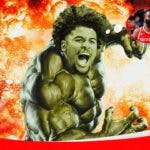The Houston Rockets let one slip away in Game 1 vs. the Golden State Warriors. It was a winnable game, and a Game 1 win would've set the tone for the series and put pressure on the defending champs.
Regardless, a Game 2 victory would mean just as much for the Rockets in wrestling home court advantage away. As Mike D'Antoni ponders adjustments for Tuesday's game, there may not be a whole lot to change. The Rockets, in general, typically don't make too many major adjustments over the course of a series. They force teams to adjust to them with their isolation-based play, their high-volume three-point shooting, and the unstoppable nature of James Harden.
Harden is a force of nature, and teams have to scheme around him. He is inevitable. He averaged an insane 36.1 points per game in the regular season. And he scored 35 points in Game 1, albeit on a less-than-desirable 32% from the field.
The Rockets will continue to rely on Harden, as he's their bread-and-butter. But adjustments are always needed in each seven-game chess match. After the Warriors blew out the Rockets in Game 1 of last year's Western Conference Finals, Houston responded by moving the ball more, getting a lot more open looks, and won Game 2 easily.
Will this year's series follow the same storyline? Here are four adjustments that the Rockets could make to even up the series in Game 2:
4) Stop arguing foul calls
Nowadays, all teams do it. In today's NBA, where the slightest contact can be called as a foul, it opens up a world of questions of what should be called a foul and what shouldn't be. It doesn't help that the consistency varies from player to player. For example, a star player who's adept at drawing contact could get a certain foul call, but the same contact on the other end will be a no-call.
As a result, players are constantly arguing calls, as was the case in Game 1. Both Warriors players and Rockets players expressed their frustration over inconsistency in foul calls. And while that's natural, and every team does it, it could actually hurt the team.
Credit the Warriors' defense for holding the Rockets to 41.9% shooting from the field. But the Rockets' players definitely felt they should've been getting more calls.
Chris Paul was ejected with four seconds left in the game because of his second technical foul arguing with the refs. With just seconds remaining, Paul's ejection didn't hurt the Rockets. But what if it had occurred earlier in the game? The loss of Paul would mean a great deal. Outside of the ejection, there were multiple times where players looked to the ref with their hands raised after a play, expecting a whistle that never came.
A ref isn't going to change his mind after a play has occurred, so the arguing, the glares at refs, and the hands thrown in the air only serve to slow the defense down as they get back in transition. And against the Warriors, little things like that could hurt.
Sometimes, Harden would also fall after he shot a three to exaggerate the contact from his defender. And while there was contact, if it's not called, Harden was left to pick himself up and sprint back while the Warriors now had an advantage in transition.
Teams can't control calls. They're going to get some go their way and some not go their way. And every team could use this lesson, but to the Rockets especially, where there is very little room for error to upset the Warriors: stop arguing foul calls, and just play the game.
Stay focused and locked in on what's happening rather than complaining about what isn't being called. It'll help their play and focus on the court, and it'll keep them from earning those dreaded technicals, which are just free points for the Warriors.
The Warriors, likewise, argue with the refs a good amount, and Draymond Green earned his third technical foul of the playoffs because of it. But if the Rockets take the high road and choose to play on, it could pay dividends in this series. Game 1 had questionable calls and non-calls, as will every game in this hotly-contested matchup.
The Rockets can't control what happens to them, but they can control how they respond to it. And that may make a huge difference.
3) Push the ball in transition
The Warriors typically boast a vaunted defense where they can switch almost anything, and have the length and athleticism to defend all positions. But this year, the Warriors' defense has been suspect. The focus and effort level have been far from what it used to be.
Attacking the Warriors' defense in transition, before they can get set up, may be beneficial for the Rockets. There are times when Houston wants to get the rock in the hands of Harden, and just let him go to work in isolation. And that's fine. But when they have the chance to, they should run.
In the postseason, the Rockets are averaging 21.8 points per game in transition, the second-most in the playoffs. But in Game 1, they merely scored 13 points in transition. In Game 2, they should mix it up, pushing the pace at times to catch the defense out of position.
The Rockets love to shoot three's, put up an NBA-record 3,871 three's in the regular season, and also made an NBA-record 1,323 of them. They launch at will from long range, and finding open spots on the perimeter is easier in transition, and it could help steal some points in a matchup where every point matters.
2) Continue to attack Stephen Curry
Stephen Curry was in foul trouble in Game 1, as he reached on Rockets' drives constantly. His lack of discipline on defense could prove detrimental to the Warriors, especially when they're forced to sit Curry for extended minutes. Curry hasn't proven that he can stay in a game with four or five fouls, and stay disciplined enough to not pick up any more for several minutes. In Game 2, the Rockets should continue to attack Curry, who ended Game 1 with five fouls.
Harden loves to isolate on Curry, and very much prefers to drive on him. Since the 2016-17 season, there have been 2,800 unique matchups where two players are matched up against each other at least 125 times. Of those, Curry defending Harden produces some revealing numbers. Only one other matchup includes more drives from a player than Harden driving on Curry. Only two other matchups lead to more free throws from the offensive player. And the Harden-Curry matchup leads to more points for the offensive player (Harden) than any other matchup.
It's no surprise that the Rockets actively hunt for the Harden-Curry matchup. The Warriors counter by having Curry hedge on Harden, and then retreat back to his normal assignment. But eventually, and inevitably, Curry ends up on Harden a good amount through the course of a game.
Harden shouldn't “bail” Curry out with a step-back three every time, and he knows it too. Harden should continue to drive on Curry, bait Steph into reaching, and make him rack up those fouls. Having Curry on the bench helps slow the Warriors' offense down, and makes them to get into the slog of KD-isolation plays.
1) Help off of non-shooters
Kevin Durant torched them for 35 points in Game 1, and no team is going to have success covering Durant consistently. He's one of the best scorers the league has ever seen. But in Game 1, the Rockets chose to mostly stick to their men, and force the Warriors to beat them one-on-one. Which Durant did.
The Warriors ran screens to get Durant on a smaller player, like Chris Paul. Then, KD would post up, turn around, and nail the fadeaway jump shot.
But the Rockets will need to force the ball out of his hands to slow him down. Teams have had success against the Warriors helping off of their non-shooters. Andre Iguodala, Shaun Livingston, Kevon Looney, and Draymond Green are all not threats from the perimeter. And while you have to pick your poison with Golden State, it's beneficial to help off of someone like Iguodala on the perimeter and double-team Durant.
Those “non-perimeter” players came up big in Game 1 for the Warriors, as Iguodala scored 14 points on 6-7 shooting and Draymond had 14 points on 7-9 shooting. But their points didn't come from the outside.
If KD drives, and the Warriors have everyone spaced on the perimeter, the Rockets should have a defender of a non-shooter help on the drive and force Durant to kick it out. While this is common basketball sense, and most teams do this against Golden State, the Rockets didn't do it a whole lot in Game 1.
Durant had open driving lanes, and strangely, Iguodala and Green weren't often completely wide open on the perimeter. Instead, their defenders chose to hug up on them and pressure them when they had the ball. That strategy has its benefits as well, as Draymond is a major facilitator of that offense, but having their defender leave them and help on the Warriors' other elite shooters may be the way to go in Game 2.
Whether or not the Rockets do any of the above suggestions, they'll likely still hang with the Warriors in Game 2, and throughout the series. The Rockets are very familiar with the Warriors. They know what it takes to beat them, and they have the drive and motivation after last year's Western Conference Finals defeat. Whether they make adjustments or not, the Rockets are real threats to the Warriors' throne in this series.
And if a lack of focus hits the Warriors again, as it has many times this season, the Rockets have a very real chance at stealing it.




